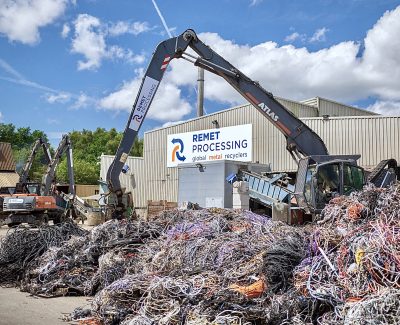How to Separate Scrap Metal for Recycling?
From construction companies to scrap metal merchants, a whole host of industries come across scrap metal and recycling it can bring a range of benefits
While first and foremost, it’s a great way to make some extra money, recycling scrap metal is also good for the environment and is a way to safely and efficiently dispose of any excess metal your organisation has in its possession.
At Remet Processing, we have more than 100 years of combined experience in the metal industry. Working alongside clients of all sizes including scrap metal merchants, car breakers and demolition companies, we strive to provide a leading service to everyone we work with while remaining committed to environmentally friendly practices.
Our team is well-versed in handling the recycling of all kinds of metal, and in order to better help you understand the process, we’ve put together a handy guide outlining how to separate scrap metal for recycling.
Identify your non-ferrous metals
Before you take your scrap metal to a specialist metal processing plant, such as ours, you should separate the materials you have into non-ferrous and ferrous metals. Here at Remet Processing, we primarily deal with non-ferrous metals, although we do occasionally trade some ferrous metals, too.
Non-ferrous metals refer to any metal products that do not contain any iron elements. Metals that have iron in have their own distinct properties, and so need to be handled differently.
Common non-ferrous metals include:
-
- Copper – easy to identify by its bronze colour and typically found in cables, wires and piping
- Brass – yellow in colour and can be found in a variety of household appliances
- Aluminium – one of the most lightweight metals and usually silver in colour
Organise your metals into containers
Now that you’ve categorised the metals, you can organise the scrap further by placing them into containers depending on their characteristics and grades.
By doing this, you’ll make the process easier once you arrive at the metal recycling facility.
The more often you carry out this process, the more you’ll get used to the different kinds of metals you’re handling and will become more accustomed to their differences and properties.
Clean your metal
It is not uncommon for scrap metal to be dirty, rusty and weathered. If you have any dirty pieces of metal in your collection, be sure to separate these from the clean ones.
Then, give these pieces a good clean. They may require extra processing if dirty, and clean metal is always of higher value than dirty items, so it’s in your favour to clean it up before taking it to a recycling plant.
Here at Remet Processing, we regularly handle the scrap metal of scrap merchants and large-scale customers from across Yorkshire. Selling to us could not be simpler. We offer competitive rates and provide fast payments while recycling every type of metal in a sustainable and environmentally friendly manner for your peace of mind.
To find out more about what we do or to enquire about our scrap metal services, contact Remet Processing today.
